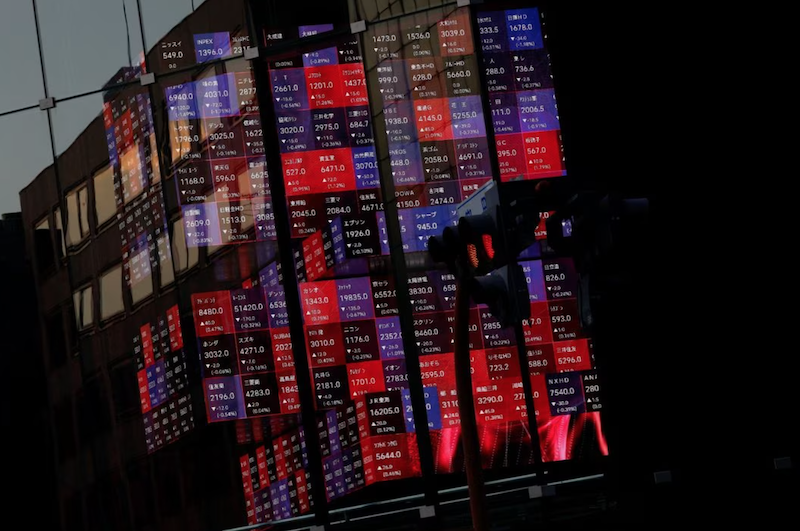Asia’s major stock indexes saw a mixed day of business on Tuesday with uncertainty over a turnaround in interest rates and the global economy dampening the mood on trading floors.
Hong Kong’s Hang Seng went into reverse, dragged back by property and tech stocks, while mainland China shares were flat on muted economic data and the absence of any signs of major stimulus pledges out of Beijing.
But Japan’s Nikkei share average rallied and the yen sagged, after the Bank of Japan (BoJ) kept its ultra-loose monetary policy unchanged and offered no hints of an early end to negative interest rates.
Also on AF: Tencent Leans on Old Foe ByteDance in Gaming Dominance Bid
The Nikkei climbed 1.41% to end the day at 33,219.39. The broader Topix reversed an early loss of 0.21% to end 0.73% higher. The BoJ’s announcement came during the midday recess.
The yen weakened as far as 143.78 per dollar following the announcement and last traded down about 0.5% at 143.50.
The BoJ kept its short-term rate target at -0.1% and that for the 10-year government bond yield at around 0% in line with expectations. However, it also opted to leave intact dovish guidance that pledged to take additional monetary easing steps “without hesitation” if needed.
“There are extremely high uncertainties surrounding Japan’s economy and prices,” the BOJ said in a statement.
Speculation had been building in the market for the BoJ to exit negative short-term rates as soon as its meeting next month.
“Given the markets are preparing for rate-cutting cycles in the US and Europe next year, it’s sensible for the BoJ to wait things out,” said Kyle Rodda, senior financial market analyst at Capital.com.
Technology shares extended gains, with chip-testing equipment giant Tokyo Electron jumping 3.67% and chip-testing machinery maker Advantest advancing 4.1%.
Downbeat China Data
Chinese stocks ended largely flat, as investor sentiment remained muted. Markets could not shake their malaise following last week’s mixed economic data and the mild response to the Central Economic Work Conference (CEWC) readout, said Brendan Ahern, chief investment officer at KraneShares in a note.
November data showed domestic demand taking another step down, with retail sales growth almost halving and most major housing indicators deteriorating, said analysts at Barclays.
China’s blue-chip CSI 300 Index closed up 0.14%, while the Shanghai Composite Index edged up 0.05%, or 1.59 points, to 2,932.39. The Shenzhen Composite Index on China’s second exchange rose 0.12%, or 2.10 points, to 1,807.54.
Tech stocks traded in Hong Kong were down 0.6%, with Chinese food delivery giant Meituan slumping 5.7% to a near 4-year low. Shares of mainland property developers were down 3.3%, with Country Garden Services down 11.7%.
The Hang Seng Index dropped 0.75%, or 124.23 points, to 16,505.00.
Elsewhere across the region, in earlier trade, Singapore and Taipei fell but Seoul and Mumbai advanced. MSCI’s broadest index of Asia-Pacific shares outside Japan was flat and just below a four-month high.
Shipping Shuns Red Sea
Oil held overnight gains after producer BP followed other shipping firms and said it would avoid the Red Sea following recent attacks by Houthi forces. Several countries have agreed to joint patrols to try to safeguard commercial shipping.
Yields on Japanese government bonds rose very slightly in morning trade, tracking a modest lift in Treasury yields overnight.
The 10-year yield had climbed 2.8 basis points after Federal Reserve Bank of Cleveland President Loretta Mester and Chicago Fed President Austan Goolsbee each pushed back at market bets on swift US rate cuts next year.
Equity markets mostly shrugged off the remarks, with the Dow Jones making a record high on Monday, while the S&P 500 drew nearer to the milestone.
Traders reckon the slowdown in inflation means the Fed will have to ease policy just to stop real rates from rising, and are wagering on early and aggressive action.
Currency markets were broadly steady ahead of the BoJ decision. The dovish outlook for US rates had dragged the dollar index down 1.3% last week, though similarly aggressive projections elsewhere are limiting further falls.
Markets imply around 150 basis points of easing by the European Central Bank next year, and 114 basis points of cuts from the Bank of England.
That kept the euro to $1.0921 and sterling to $1.2556. The Australian dollar lifted very slightly to $0.6714 after minutes showed policymakers had considered a second straight hike in December.
Key figures
Tokyo – Nikkei 225 > UP 1.41% at 33,219.39 (close)
Hong Kong – Hang Seng Index < DOWN 0.75% at 16,505.00 (close)
Shanghai – Composite > UP 0.05% at 2,932.39 (close)
London – FTSE 100 > UP 0.09% at 7,631.66 (0933 GMT)
New York – Dow > UP 0.01% at 37,306.02 (Monday close)
- Reuters with additional editing by Sean O’Meara
Read more:
Freight Firms Avoid Red Sea, Hitting Asia-Europe Supply Chains
Will China Take on More Debt Chasing 5% Growth in 2024?
China Banks Pushed to Sell Bad Loans as Consumer Defaults Soar
Nikkei Slips on BoJ Easing Bets, Tech Drags on Hang Seng























